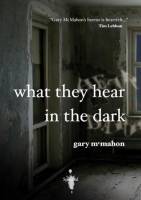Mark Valentine, ‘A Revelation of Cormorants’ (2010)
R.B. Russell, ‘The Beautiful Room’ (2010)
Gary McMahon, ‘What They Hear in the Dark’ (2011)
A triple-decker of single-story chapbooks, today: the latest two from Nicholas Royle’s Nightjar Press, and the launch title from Simon Marshall-Jones’s Spectral Press.
***
 The first of our new Nightjar titles is ‘A Revelation of Cormorants’ by Mark Valentine. It’s not long since last I read a story one of his stories, and, when I did, I was very impressed with Valentine’s control of voice; the same quality impressed me again on reading this piece. William Utter is a writer who has rented a cottage on the Galloway coast to work on a book about the lore of birds. Today, he heads out intro the bay to see some cormorants, and it’s an open question whether inspiration or the tide will strike first. Valentine builds Utter’s mental world very well, with imagery largely built around birds and books, and a slightly dusty mode of expression. He also creates a strong atmosphere in the story; and yet… I think something about the whole isn’t quite satisfactory. I can appreciate intellectually what the ending is doing, but I find that it doesn’t have the deeper emotional impact which would lift the piece to the next level.
The first of our new Nightjar titles is ‘A Revelation of Cormorants’ by Mark Valentine. It’s not long since last I read a story one of his stories, and, when I did, I was very impressed with Valentine’s control of voice; the same quality impressed me again on reading this piece. William Utter is a writer who has rented a cottage on the Galloway coast to work on a book about the lore of birds. Today, he heads out intro the bay to see some cormorants, and it’s an open question whether inspiration or the tide will strike first. Valentine builds Utter’s mental world very well, with imagery largely built around birds and books, and a slightly dusty mode of expression. He also creates a strong atmosphere in the story; and yet… I think something about the whole isn’t quite satisfactory. I can appreciate intellectually what the ending is doing, but I find that it doesn’t have the deeper emotional impact which would lift the piece to the next level.
***
 Birds appear again, though in a rather different context, in Nightjar’s other new chapbook. R.B. Russell‘s ‘The Beautiful Room’ is the tale of Maria and John, a couple looking for a house in a foreign country to where John is moving for work. As we join them, they’re looking around a place in the countryside, with which Maria has fallen in love, thanks to one room in particular; John is much less keen, and would prefer to live in the city. Their initial argument over this reveals deeper tensions in their relationship: Maria has sacrificed her work to make this move possible, and resents John’s not putting her wishes first in the house choice. Russell depicts these rising tensions elegantly, and they carry over into the second half of the story, when the couple investigate a mysterious scrabbling sound coming from behind the walls. The unexpected final moment comes as a beautiful image of release.
Birds appear again, though in a rather different context, in Nightjar’s other new chapbook. R.B. Russell‘s ‘The Beautiful Room’ is the tale of Maria and John, a couple looking for a house in a foreign country to where John is moving for work. As we join them, they’re looking around a place in the countryside, with which Maria has fallen in love, thanks to one room in particular; John is much less keen, and would prefer to live in the city. Their initial argument over this reveals deeper tensions in their relationship: Maria has sacrificed her work to make this move possible, and resents John’s not putting her wishes first in the house choice. Russell depicts these rising tensions elegantly, and they carry over into the second half of the story, when the couple investigate a mysterious scrabbling sound coming from behind the walls. The unexpected final moment comes as a beautiful image of release.
***
 Coincidentally, there’s a couple with a new house and a relationship under strain in Spectral Press’s first title, ‘What They Hear in the Dark’ by Gary McMahon. Rob and Becky are renovating a house whilst still coming to terms with the death of their son Eddie, and find a strange room which, according to the plans, shouldn’t be there. They call it the Quiet Room, because it seems to absorb all sound.
Coincidentally, there’s a couple with a new house and a relationship under strain in Spectral Press’s first title, ‘What They Hear in the Dark’ by Gary McMahon. Rob and Becky are renovating a house whilst still coming to terms with the death of their son Eddie, and find a strange room which, according to the plans, shouldn’t be there. They call it the Quiet Room, because it seems to absorb all sound.
There is, of course, something mysterious about the Quiet Room, but McMahon’s ultimate focus is less that than the characters of Rob and Becky. What impresses me most about the story is what’s going on beneath the words and imagery, the way that the Quiet Room comes to embody the couple’s different responses to Eddie’s death — for Becky, the silence is comforting, as she feels it brings her closer to Eddie; for Rob, the Quiet Room is a place of fear, caused by his search for a deeper explanation for his son’s death than the one Becky has accepted. These conflicting views come to reflect the wider tensions in the couple’s relationship, making for a nice balance between character and atmosphere. McMahon’s story is a good start for Spectral Press; I’ll be keeping an eye on what they do in the future.
 Tomorrow is
Tomorrow is
Recent Comments